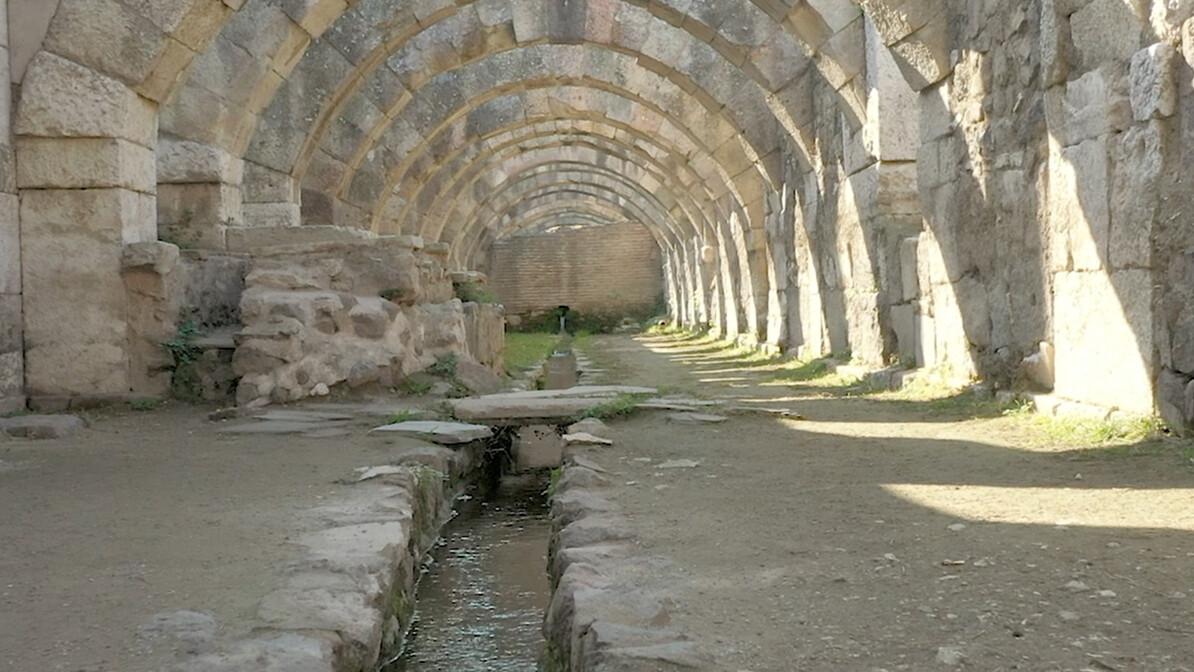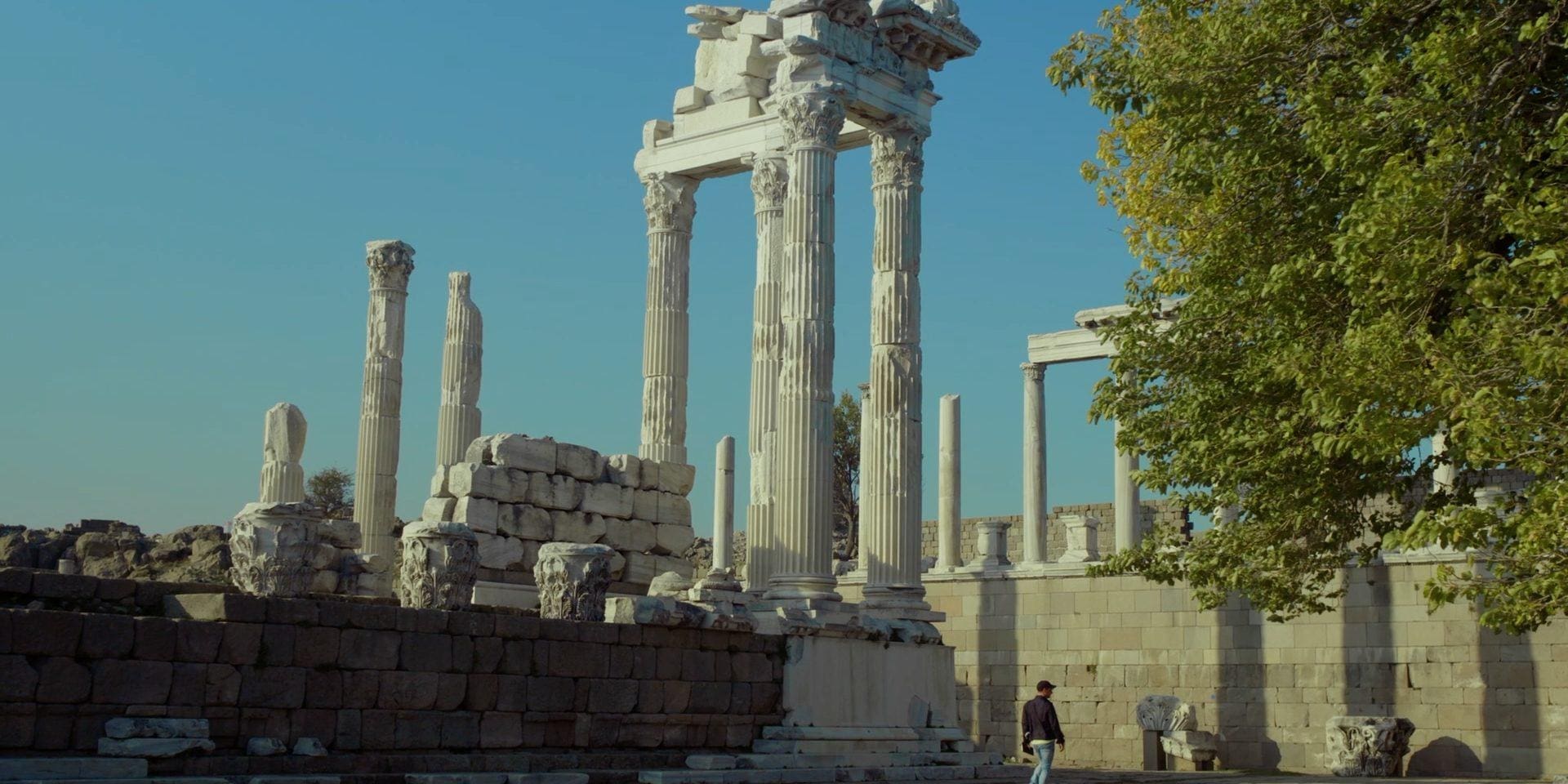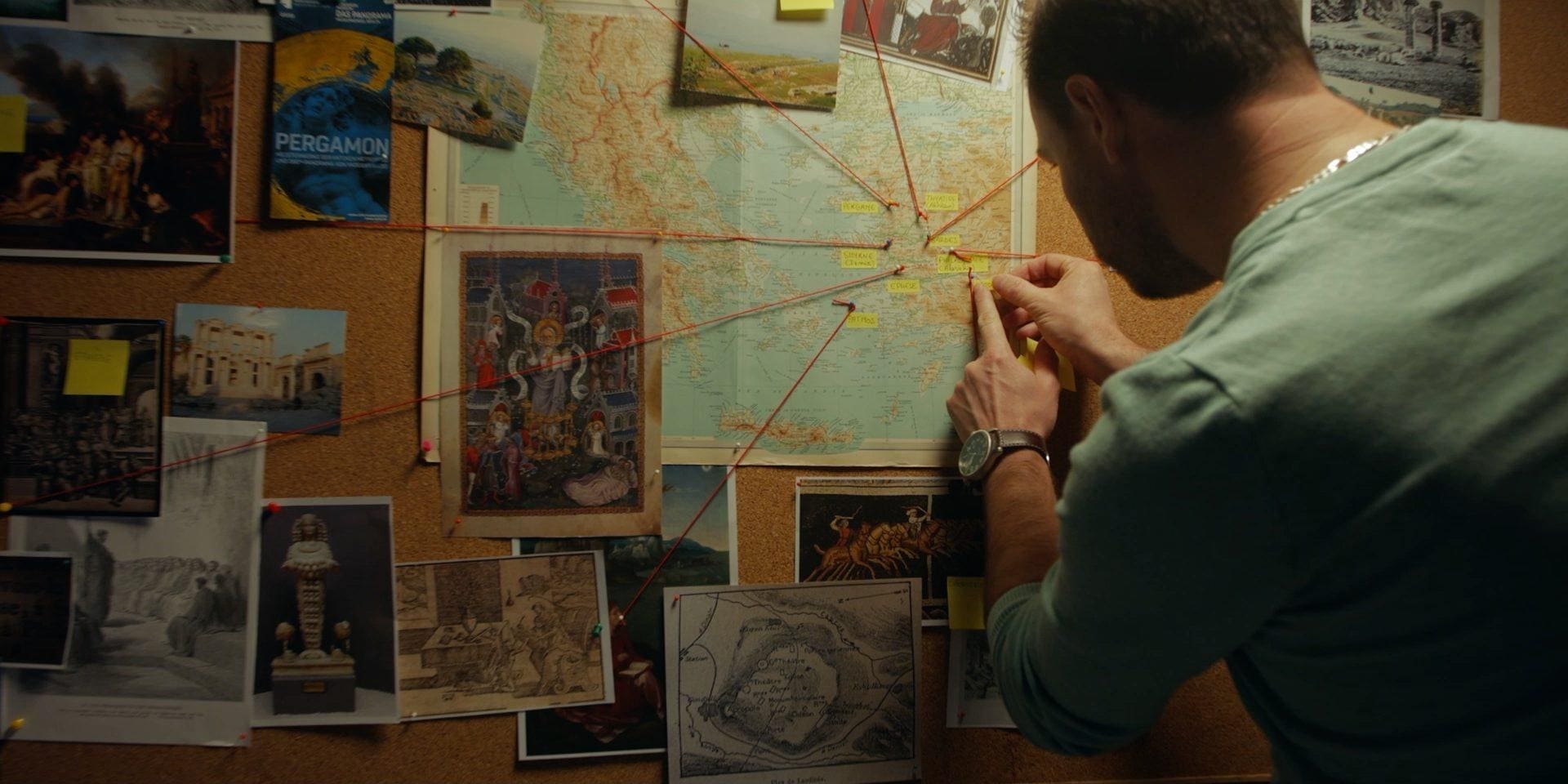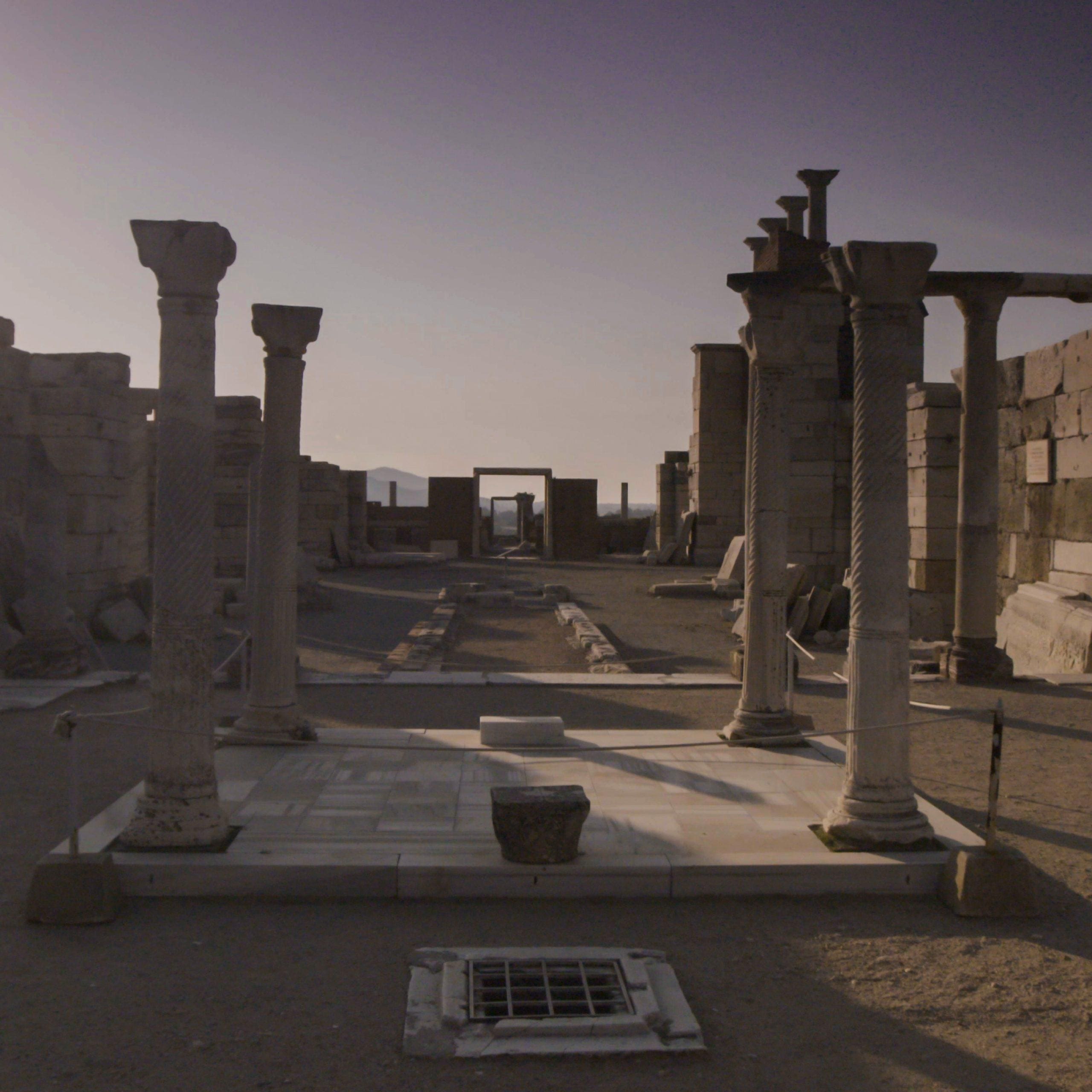- Home
- Entertainment
- Tim Mahoney and The 7 Churches of Revelation (Part 1)

Tim Mahoney and The 7 Churches of Revelation (Part 1)
John Farrell: Could you please tell me a little bit about the film, The 7 Churches of Revelation: Times of Fire?
 Tim Mahoney: The 7 Churches of Revelation is a film by French filmmaker Christophe Hanauer. The backstory is that Christophe saw one of my films, Patterns of Evidence, on Netflix in France. Patterns of Evidence went worldwide and Patterns of Evidence: Exodus went worldwide. And it was in France.
Tim Mahoney: The 7 Churches of Revelation is a film by French filmmaker Christophe Hanauer. The backstory is that Christophe saw one of my films, Patterns of Evidence, on Netflix in France. Patterns of Evidence went worldwide and Patterns of Evidence: Exodus went worldwide. And it was in France.
When he saw it, he was inspired to make a film on the book of Revelation using that same technique of being an investigative filmmaker and going to the locations where the events happened. Trying to understand it and unravel the setting that those early seven churches were faced with. What were they dealing with as a people and why were these letters going to them?
The thing I really had to think about was if I was going to get involved with another topic? I had been focused as a filmmaker on the book of Exodus for twenty years. I’ve been investigating the book of Exodus. So, when they contacted me, I didn’t know what to do because I had my hands full with the types of films I was making. And yet I felt that I needed to think and pray about whether I should help this filmmaker get this message out.
Then I saw what he was doing. I felt that after praying and talking to my wife and giving it some thought, I thought, ‘I’m not sure how we’re going to do it, but we’re going to do it. We’re going to do what we can to get this message out.’
I think the message of the film is an important one for the church today. It’s an important message for all of us. That’s how I made the decision to become involved with this film.
JF: What is that overall message you want the films to portray, and why is that message so important today?
 Tim: I think the overall message of this film is that Christ is coming back. And are we ready? Are we ready for the return of Christ?
Tim: I think the overall message of this film is that Christ is coming back. And are we ready? Are we ready for the return of Christ?
I think it’s both. Have we been doing the things we’re supposed to be doing – what He’s called us to do? If you don’t know what those things are, then you better find out. You better spend time understanding what your mission is. I think more and more people need to know why they exist. What purpose are they here for? Once you become a believer, you need to know what He wants you to do with your life? How should you go about doing the things you’re supposed to be doing?
I think the message of this film is two-fold in the sense that it asks, ‘will I be doing the things I’m supposed to be doing?’ You can look at those early churches. Some of them got caught up in things they weren’t supposed to be doing. And some of them were being faithful. Sometimes being faithful also caused them to be persecuted. That’s the other side of the coin of “are you ready?” If you are going to do the things God calls you to do, to be a testimony, to do mission work, or whatever, are you ready to be faithful to the end of that even if it means to the end of your life?
 Those are tough questions because most of us like living. We want to have a happy life and go on vacation. We don’t want to be in an uncomfortable setting. We don’t want to be not liked, and we don’t want to have persecution. But what you can see is if you’re going to be a true follower of Christ, if the culture is pushing in a direction that’s causing you to deny your faith, then you can’t fall to that. You need to be strong even in light of that. We’re seeing Christians in other parts of the world today, which the film shows, saying I’m going to choose Christ and my faithfulness to Him over my own life.
Those are tough questions because most of us like living. We want to have a happy life and go on vacation. We don’t want to be in an uncomfortable setting. We don’t want to be not liked, and we don’t want to have persecution. But what you can see is if you’re going to be a true follower of Christ, if the culture is pushing in a direction that’s causing you to deny your faith, then you can’t fall to that. You need to be strong even in light of that. We’re seeing Christians in other parts of the world today, which the film shows, saying I’m going to choose Christ and my faithfulness to Him over my own life.
JF: What sets this film and film series apart from other documentaries that have been released over the past few years?
Tim: This one is different because, to my knowledge, there haven’t been many that have taken on this subject matter of the seven churches of Revelation. This is the first time that I have ever seen a film series that has unwrapped the historical, archeological background of the early churches that were there. That’s the reason why this film is so significant.
It’s really showing us the courage it took for those early Christians to stand up against the Roman Empire and say, “No, Caesar is not my God. Jesus is my Lord and Savior, and I will not deny Him.” That is the lesson that we learned from The 7 Churches of Revelation.
There hasn’t been a film like that that has given us this background. I can tell you that many scholars who’ve seen it – and there are Revelation scholars who’ve never been able to actually go to those locations or see those things – are saying, “This is a very important film so that we can understand the historical setting. And then we understand the testimony that happened in that setting of those different believers that paid dearly to follow Christ.”
JF: Like Polycarp.
Tim: Exactly. Polycarp is amazing. When I watched that scene, he is saying, “How could I deny my Christ?” They gave him a simple out and he wasn’t willing to do that. He was faithful.
 JF: Why did a film about the seven churches from the book of Revelation interest you? Revelation is a very deep and often misunderstood book, yet you chose to do a film series on these letters from John to the seven churches. What about this interests you?
JF: Why did a film about the seven churches from the book of Revelation interest you? Revelation is a very deep and often misunderstood book, yet you chose to do a film series on these letters from John to the seven churches. What about this interests you?
Tim: I think the fact that there’s archeology and a lot of my films are going back and looking at the historical context of the Bible. I had spent quite a bit of time making the Patterns of Evidence films: The Exodus, The Moses Controversy, and The Red Sea Miracle I & II. All of those films have an archeological, historical component to them where we’re looking for a pattern of evidence that the scriptures are saying is there. Then we see that pattern in archeology.
This particular film is doing the same thing. It’s finding the patterns of the archeology and showing the actual stadium where the riot happened, where people were upset with Paul and the teaching and all the Christians coming. We see the Altar of Pergamon, the Seat of Satan. We see archeological evidence that these cities are real and these churches were real. We know the testimony that is there. That’s why there is something about testifying to the truth of God’s Word.
This is a new approach. It’s not all allegory or all prophetic. It’s saying there is a real place, there’s a real setting, and these are real letters that went to those churches at a particular time in history. Even though those letters have prophetic information in them, like many times in Scripture, it speaks to the church at Ephesus, but it also speaks to the church today.
Why it is relevant for today is because we’re facing a lot of uncertainty right now. Almost the same kinds of trials that the early church was facing – we know in other parts of the world that it’s happening – but it’s potentially happening more in our own nation where to be a Christian is going to take a potential level of persecution that people never experienced before.
JF: Why do you think Jesus told John to write to these specific seven churches to address their issues?
Tim: I think these were vibrant communities where Paul had been. It might’ve been that those churches were getting the gospel. In other words, why wasn’t it some other church like Jerusalem or other places? There was a fervor that was happening with Christianity there and it was causing a stir. I think that’s something for us to look at.
Christianity was causing such trouble that it could not be ignored. I think that’s something to testify to the authentic-ness of those Christians and that they were seen as possibly counter-culture. If they didn’t worship the same gods, then that caused anger in the trade guilds and the different people because they tied the religious worship of idolatry to their political natures. They had cities that were connected to gods, and that was the protector of the city.
If you were going along and saying that you didn’t believe that that god was true, which is what happened in Ephesus where Paul won so many people over to Christianity that the financial and economic well-being of silversmiths went down. People weren’t buying idols.
It asks the question, “Is my Christianity authentic compared to the early church? Am I going along with the flow?” I think the future letters that we’re going to see in the next film are basically going to say that some of these churches were trying to cooperate with secular culture.
…
Learn more about The 7 Churches of Revelation at 7churches.com
Learn more about Patterns of Evidence at patternsofevidence.com
Learn more about the Historical Faith Society at historicalfaithsociety.com
Trending Now
Sign up today for your Inspiration Today Daily Newsletter
Supercharge your faith and ignite your spirit. Find hope in God’s word. Receive your Inspiration Today newsletter now!
John Farrell
John Farrell is the Digital Content Manager for inspiration.org. In addition to having written more than 1,000 articles, press releases, and other pieces of content for Inspiration Ministries, NASCAR, Lionel, and Speed Digital, he authored The Official NASCAR Trivia Book: With 1,001 Facts and Questions to Test Your Racing Knowledge in 2012. John is a graduate of Appalachian State University and lives in Concord, N.C., with his wife and two sons.
Related Articles
April 16, 2024
‘It Is Well with My Soul’
“It Is Well With My Soul” is a hymn that may bring peace and comfort when considering the peace…
Next Steps To Strengthen Your Walk
Submit A Prayer Request
We are here for you. Simply click on the button below to reach us by form, email or phone. Together we will lift our hearts and voices with you in prayer.
Partner WIth Us
Sow a seed of faith today! Your generous gift will help us impact others for Christ through our global salvation outreach and other faith based initiatives.
Inspiration TV
Watch Christian content from your favorite pastors, christian movies, TV shows and more.






